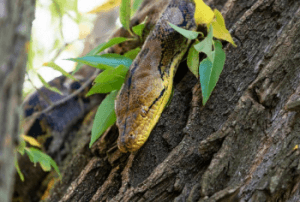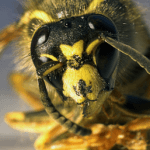
Snakes are dangerous predators. Most of them are venomous and can be deadly to both humans and animals. There are about forty thousand recorded deaths every year due to snake bites. Snakes are usually aloft and keep to themselves. They mostly avoid human populations as well. And contrary to popular beliefs, snakes are not aggressive. They will not bite unless provoked or spooked.
But there are times where we find snakes near human populations, and it is best to prepare for them. In all honesty, snakes are even providing you their services by eating rodents and small creatures that can harm and infest your house, like rats. However, since they pose a threat on their own, people are wary of them, and they have good reason to, but did you know that people use plants to repel snakes? It is like putting up a sign saying keep out.
Quick Overview
- Lavender
- Snake Plants
- Lemongrass
- Witch Hazel
- Marigold
- Garlic
- Yucca
- Snakeroot
- King of Bitters
- Wormwood
Lavender
Lavender has many uses and has been a great help for humans. The scent from lavender calms humans but repels rodents, insects, and snakes. You can strategically place lavender among your blooms to deter snakes from entering your lawn. Lavender works two ways, it serves as a snake repellent and at the same time repels rodents as well. Since snake hunts for rodents, it will leave your garden alone.
Snake Plants
Snake plants or mother-in-law tongue plant works as a snake repellent. For some reason, snakes are afraid of this plant. Not only because it looks like another snake from afar, but it also scratches their skin and can hinder them from crawling forward. Snake plants also provide additional benefit to humans as it produces more oxygen. Imagine inhaling pure and unpolluted air.
Lemon Grass
Lemongrass is called as such since it releases a citrus-like scent. Lemongrass also has citronella, which is a good mosquito repellent. But it is not common knowledge that lemongrass is also a snake repellent. The citric smell that lemongrass releases repel snakes. There are many uses for lemongrass, and some of them are mouthwatering dishes. They are also easy to plant and need low maintenance. It is a win-win situation if you ask me. Some people also add the fresh leaves of lemongrass to their tea to add more flavor.
Witch Hazel
Witch Hazel is not just another type of plant that repels snakes. Witch hazel has a substance extracted for snake repellent recipes. Witch hazel has a strong odor that snakes hate. Not only that, witch hazel has compounds that irritate and burn snakes when they touch them. In America, witch hazel is not just your ordinary plant, as it has many medicinal properties like anti-inflammation, astringent, reduces skin irritation, and more. Keeping them in your property not only adds beauty to your surroundings but also adds protection from snakes.
Marigold
Marigold is known for having bright golden and sometimes reddish blooms. They are also known to have a pungent smell that repels snakes. In addition to their strong odor, these beautiful flowers also have roots that can spread downward, so even if snakes create tunnels for hiding, marigold roots can still reach them. Since marigold has a pungent smell, you would want to plant them near the border and away from your house.
Garlic
Garlic has a strong odor. Snakes avoid garlic because the smell irritates them. And what better way to infuse garlic in your garden than to plant them. Plant garlic in your garden in addition to your plants. It will repel snakes and even mosquitoes.
You can also use garlic in your everyday dishes so it will never go to waste. Aside from being a widely used ingredient in dishes, garlic is also known to have medicinal properties that can cure high blood pressure.
Yucca
Yucca has tough pointy leaves and white flowers. You would see yucca plants in dry and hot places like Texas and Florida. But due to its beauty, the yucca plant can be seen as a great piece in landscaping. Aside from landscaping, yucca is now gaining popularity because of another reason; to repel snakes. Snakes are afraid of the yucca plant because the leaves can scratch their skin. Due to its rough, swordlike leaves, snakes tend to avoid them as much as possible. Yucca plant is also low in maintenance and can live with minimal water.
Snakeroot
Ironically, the plant got its name because people believed that the root cure snake bites. However, snakeroot contains toxins that can be harmful to domestic animals and humans if not handled correctly. Snakeroot also repels snakes because they cannot take the smell of snakeroot. Some accounts say snakeroot treat common illnesses like hypertension, but it is yet to be proven. As snakeroot has toxins, it is best not to tamper with them.
King of Bitters
Andrographis paniculate is known for its bitter taste. Snakes have a great sense of smell, and they also fork out their tongue to taste the air. The bitter taste of the king of bitters plant repels snakes. You can never have too many plants that can protect you from invasive serpents.
Wormwood
Wormwood is widely accepted to be an ornamental plant. In the past, wormwood was a popular ingredient in treating dyspepsia and loss of appetite. Aside from that, wormwood also has been used as an ingredient in winemaking.
But did you know that dried wormwood repels snakes? That’s right, dried leaves of wormwood are scattered around areas to repel snakes. Wormwood is also easy to plant and has minimal maintenance. If you are not careful, it will eventually grow and invade other plant’s space.
Please note that these ten plants can repel snakes, but they are not effective on their own. Mix and match these plants to help keep snakes at bay. It will not only add to your garden’s appeal if placed strategically, but it will also keep serpents and other pests out.


